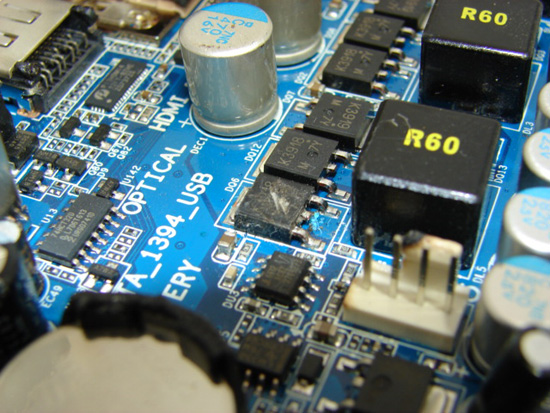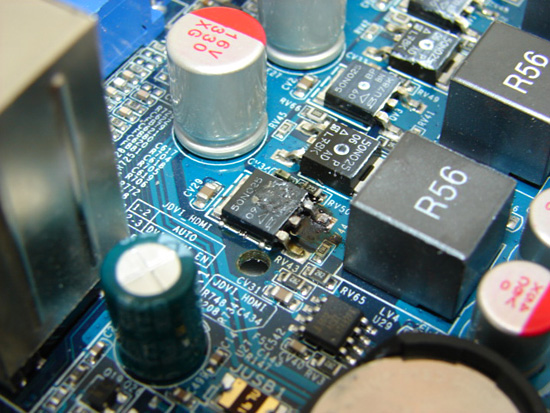AMD's Phenom X4 9950, 9350e and 9150e: Lower Prices, Voltage Tricks and Strange Behavior
by Anand Lal Shimpi & Gary Key on July 1, 2008 12:00 AM EST- Posted in
- CPUs
Overclocking or Overcooking?
We had some interesting experiences during our overclock testing. Let's just say in the motherboard section of the labs that a halon fire extinguisher is now a standard item on the test bench. Call us unlucky, abusive, or having just dumb luck, but our results these past few weeks when overclocking IGP setups has not been good. In fact, it has been downright terrible as of this week. Editors other than those who normally test motherboards had the opportunity to experience the joy of random resets and failures. After reporting extensively on the failures we experienced when using 125W TDP processors on the first release of 780G IGP boards, we thought the worse was over when the manufacturers responded with beefed up designs, BIOS updates, or officially acknowledging that certain boards were just not capable of handling the 125W TDP processors. In fact, we had not experienced any real problems with the replacement boards as we finally finished testing for the IGP roundup and looked forward to new boards featuring 140W TDP capabilities later this summer.

This 780G died while trying to overclock the Phenom X4 9350e. There's a twinge of burnt plastic on the fan header and HDMI port as well as the dead MOSFET itself.
We are still investigating, but the constant stress of 24/7 overclocking along with us trying to dial in that perfect group of settings which invariably means we push the board beyond its boundaries probably lead to our failures. While we were extremely upset for a variety of reasons (valid ones at that) when our first failures happened several weeks ago, today we are a bit amused with it actually. You see, it is not every week when you can go through five boards in less than 48 hours while trying to make an article deadline. We know three of the boards played pop goes the MOSFET as the pictures indicate, the other two died of natural causes that cannot be explained right now. In fact, it was a mix of chipsets this time from various manufacturers. Maybe the perfect storm hit us at a very inopportune time, but one lesson we have learned is that when testing overclocks in a fully loaded uATX case, it is not easy to get the marshmallows out and in place when the flames arrive.

This 780G also faced an untimely death, although the damage was contained to just the MOSFET. Either way, the board is dead.
In all seriousness, the cooling of the MOSFET/PWM area is critical when utilizing a high watt TDP processor or when overclocking a midrange Phenom CPU on these boards. It does not matter if it is a NVIDIA or AMD chipset as we have had both fail (some more spectacularly than others). We heavily suggest refraining from overclocking these processors on current IGP products unless you properly cool the MOSFET/PWM area or just do not overclock at all. While we lost several boards during the completion of this article, we would like to add that several others have not experienced a single problem to date while overclocking on an open test bench or in our test case with plenty of airflow across the board. In our opinion, it comes down to solid component choices on the board and maximizing airflow to get the most out of these boards when overclocking. In addition, none of the ATX boards based on the 790FX, 780a, or 750a has failed us while being asked to overclock at significantly higher voltages in most cases. That said, whether through BIOS immaturity or design, we did not have the best of luck with the 9950BE on the full size boards.










36 Comments
View All Comments
Sylvanas - Tuesday, July 1, 2008 - link
Wheres the 9950BE overclocking results? It is an unlocked CPU so what about Overclocking the NB? What performance difference does that bring? I doubt people that buy IGP's are going to overclocking much anyway since they are usually silent HTPC rigs...Gary Key - Tuesday, July 1, 2008 - link
The 9950BE overclocking results are coming in a different article. Unfortunately, our 790FX boards (they have been beat on for six months) were not exactly up to speed and we thought it would be better to not show anything instead of a 2.8GHz clock that obviously is not representative of the processor at this point.Also, most of our previous results were run on the 780G, a chipset that when tuned correctly and on a good board will outclock the 790FX with a discreet graphics card by the way. Jetway just released a fairly comprehensive BIOS for their new 780G we ended up using after the others started failing. We just received BIOS updates for the 780a boards and have a new 790FX/SB750 arriving shortly for a CF/SLI update on AMD (gaming is not that bad by the way on the Phenom for the mid-range market).
Increasing the NB core (IMC) clock (in Phenom it runs async from the Core Speed unlike Athlon which is Sync) drops latencies (especially L3) and increases memory performance/throughput, which in turn improves system performance. The Phenom starts to come to life when you hit a 2.6GHz core speed with a NB core clock at 2200MHz+. Depending on the application and CPU, increasing NB core speeds (getting up to 2200MHz+) can result in performance differences from 3%~12% in most cases.
Almost as important is increasing HT speed for further optimizing the pipeline links (CPU/Memory/PCIe,etc). Our 9950BE follow up will have an overclocking guide along with optimization details.
Sylvanas - Wednesday, July 2, 2008 - link
Excellent, thanks for the info Gary- I look forward to the follow up 9950BE overclocking article. If there is some info on the SB750 aswell that's even better :)DigitalFreak - Tuesday, July 1, 2008 - link
AMD post X2 = ROFLMAOThe C&Q thing is probably another respin waiting to happen. What a bunch of boobs.
acejj26 - Tuesday, July 1, 2008 - link
what's a seccond?why didn't you include the 9950 in the first page of benchmarks?
is the 9960 a new processor from AMD?
i've come to expect these errors from other staff writers, but not you Anand.
skiboysteve - Tuesday, July 1, 2008 - link
why are you using 780G to overclock and check stability on the same article you say how someone else wrote an article about how that is a bad idea because of power...you even say at the bottom of your overclocking page, a mere footnote, that you got higher clocks on a different platform
js01 - Tuesday, July 1, 2008 - link
I think they scale much better then that hothardware got the 9950be to 3.1ghz barely even trying and the 9350e to 2.7ghz.http://www.hothardware.com/Articles/AMD_Phenom_X4_...">http://www.hothardware.com/Articles/AMD...nom_X4_9...
Gary Key - Tuesday, July 1, 2008 - link
It depends on the board and CPU actually. We have a retail 9850BE that will do 3.3, but three others struggle to make it to 2.8. Until we see some consistency in the retail parts, we would rather play it safe with the comments. A separate overclocking article is on its way though with the new lineup. :)woofermazing - Tuesday, July 1, 2008 - link
Odd that you guys couldn't get any OC out of the 9950. Results from other sites have been pretty impressive using the stock cooler. 3.6ghz is the highest of seen so far.Clauzii - Wednesday, July 2, 2008 - link
I second that!PS: And why does the comment page keep looking like pre-95 internet :O (I'm on FF3)